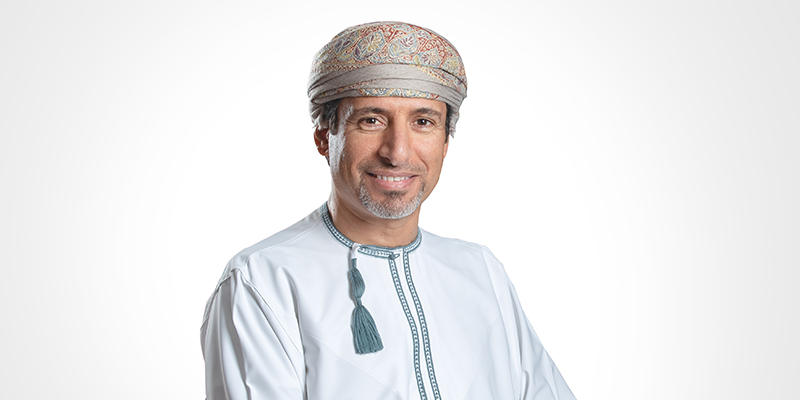
03 Apr Interview with Salim bin Nasser bin Said Al Aufi, Minister of Energy and Minerals, Oman
JT: How is the Ministry of Energy and Minerals aligning its strategies with Oman Vision 2040?
Al Aufi: The Ministry is committed to sustainability, economic diversification, and technological advancement, with a key focus on increasing renewable energy in electricity production to 30-40% by 2030 and 60-70% by 2040. To meet these ambitious targets, Oman is expanding its renewable energy sector, aiming to develop 5,000 MW of solar and 1,150 MW of wind power by 2030. The country is also driving forward its Green Hydrogen Strategy through Hydrogen Oman (Hydrom), targeting at least 1 million tons of renewable hydrogen annually by 2030. Japan is playing a vital role in this transformation. Marubeni Corporation spearheaded Oman’s first 100 MW solar IPP project at Amin, while Mitsubishi Heavy Industries is collaborating with Oman to advance gas and hydrogen-powered electricity generation, reinforcing both nations’ commitment to a sustainable energy future.
JT: With Oman’s strong oil and gas legacy, how is the country balancing this with its transition to renewable energy?
Al Aufi: Oman is maintaining its position as a reliable LNG exporter while accelerating investments in renewables. Several Japanese companies are key partners in this transition. Marubeni Corporation, in collaboration with OQ Alternative Energy, is developing a green ammonia project in Salalah. Meanwhile, J-POWER and EDF Group are leading a large-scale 4.5 GW solar and wind project in Dhofar to support green ammonia production. In addition to renewables, Oman is actively exploring carbon reduction solutions. Hitachi Zosen Corporation has partnered with Oman LNG to develop methanation technology, converting CO2 and hydrogen into synthetic methane. These initiatives reflect Oman’s strategy of integrating sustainable energy while leveraging Japan’s expertise in advanced energy solutions.
JT: As Oman advances its renewable energy sector, what key initiatives are currently in place, and how does Hydrom contribute to this transition?
Al Aufi: Oman is accelerating its renewable energy transition through large-scale solar and wind projects while positioning Hydrom as a leader in green hydrogen production. Japan is a key partner in this effort. Marubeni’s green ammonia project in Salalah aligns with Oman’s hydrogen strategy, while J-POWER’s Dhofar initiative strengthens renewable energy capacity. Mitsubishi Heavy Industries is also supporting advanced hydrogen-based electricity solutions. Hydrom plays a central role in facilitating these partnerships, attracting global investors, and establishing Oman as a regional hub for hydrogen exports.
JT: How is the Ministry using Oman’s mining sector to drive economic diversification?
Al Aufi: Oman’s rich mineral resources—including copper, chromite, manganese, marble, silica, and gypsum—offer significant opportunities for economic diversification. The Ministry is ensuring sustainable development through comprehensive geological surveys, a robust regulatory framework aligned with global environmental standards, and investment incentives that attract responsible foreign participation. Japanese firms, with expertise in resource processing and sustainable mining, have strong opportunities for collaboration. There is also growing interest from Japanese research institutions in studying Oman’s ophiolite rocks, remnants of oceanic crust displaced onto land due to tectonic movements. Currently, the University of Kanazawa and the University of Tokyo are working with the Ministry on a pioneering muography project, using muon particle detection to analyze the density of Oman’s rock formations. This research provides valuable insights into geological composition and natural resource management.
JT: How is the country integrating renewable energy and hydrogen into heavy industry?
Al Aufi: Oman is attracting leading Japanese firms to develop clean steel manufacturing powered by renewable energy and hydrogen. Companies such as Mitsui, Kobelco, and Nippon Steel are in discussions with Oman to establish green steel production facilities, reinforcing the country’s ambition to become a leader in sustainable heavy industry.
JT: What steps is Oman taking to strengthen its LNG exports and energy partnership with Japan?
Al Aufi: Oman LNG is expanding its production capacity to meet rising global demand, ensuring a stable and reliable supply for key markets, including Japan. The company has secured long-term agreements with major Japanese buyers, reinforcing its commitment to energy security. A new sales and purchase agreement, set to begin in 2025, will further strengthen these ties. In addition to supply agreements, Oman LNG is collaborating with Japanese companies on sustainability and efficiency initiatives. A notable partnership with Hitachi Zosen focuses on decarbonization and methane reduction technologies, aiming for carbon neutrality. Future collaborations may also include digitalization to enhance LNG operations, leveraging Japan’s expertise in advanced energy solutions.
JT: What new energy collaborations are Oman and Japan pursuing?
Al Aufi: Oman and Japan continue to deepen their energy cooperation. A Memorandum of Understanding between Oman’s Ministry of Energy and Japan’s Ministry of Economy, Trade, and Industry focuses on hydrogen, fuel ammonia, and carbon recycling, including methanation. Future collaborations include discussions on entering the Joint Crediting Mechanism (JCM) under Article 6 of the Paris Agreement, technology exchanges in hydrogen and carbon capture, strengthening supply chains for stable LNG and hydrogen trade, and encouraging Japanese investment in Oman’s renewable energy and mineral sectors. These initiatives reaffirm Japan’s role as a key partner in Oman’s energy transition.
JT: What is your final message to our readers about choosing Oman as their next investment and business destination?
Al Aufi: Oman offers a compelling investment landscape built on sustainability, economic diversification, and international collaboration. The country’s strong partnership with Japan across LNG, hydrogen, and renewables highlights a shared vision for a low-carbon future. With cutting-edge renewable projects, world-class LNG capabilities, and a dynamic business environment, Oman welcomes further engagement from Japanese companies to drive the future of energy together.
